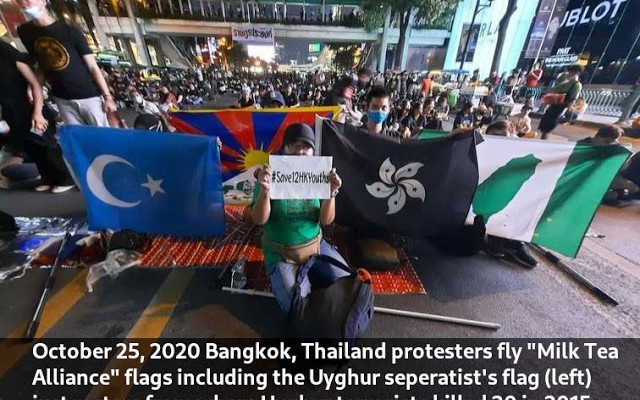The current Thai government, the Thai armed forces, and Thailand’s constitutional monarchy have led the country along a path of growing relations with China.
China is now Thailand’s largest trade partner, foreign investor, source of tourism providing more vistors than all Western nations combined, and Thailand’s largest arms supplier – surpassing the United States.
China is also a key partner in several major infrastructure projects in Thailand including the nation’s rollout of 5G technology and a high-speed railway that will eventually connect Thailand to China via Laos.
The US’ growing confrontation with China has seen attempts to recruit its Southeast Asian neighbors into a united front against Beijing. Because no government in the region is receptive to US goals regarding China’s encirclement and isolation, the US has opted to funding anti-government movements in the hopes of replacing them with governments that are.
US NED-funded fronts promoting separatism in Xinjiang, China coordinating events with Thailand’s US-funded anti-government movement is another step toward the movement’s full integration into Washington’s anti-Chinese agenda with “promoting democracy” merely the smokescreen this is being done behind.
Uyghur Terrorism is Real, China’s Concerns Justified
While organizations like the US government-funded UHRP and the Western media have attempted to downplay the violence among Xinjiang’s Uyghur separatists, older Western media reports have fully detailed the carnage Uyghur terrorism has spread across China and even beyond its borders.
The BBC’s 2014 article, “Why is there tension between China and the Uighurs?,” for example – reported (emphasis added):
In June 2012, six Uighurs reportedly tried to hijack a plane from Hotan to Urumqi before they were overpowered by passengers and crew.
There was bloodshed in April 2013 and in June that year, 27 people died in Shanshan county after police opened fire on what state media described as a mob armed with knives attacking local government buildings
At least 31 people were killed and more than 90 suffered injuries in May 2014 when two cars crashed through an Urumqi market and explosives were tossed into the crowd. China called it a “violent terrorist incident”.
It followed a bomb and knife attack at Urumqi’s south railway station in April, which killed three and injured 79 others.
In July, authorities said a knife-wielding gang attacked a police station and government offices in Yarkant, leaving 96 dead. The imam of China’s largest mosque, Jume Tahir, was stabbed to death days later.
In September about 50 died in blasts in Luntai county outside police stations, a market and a shop. Details of both incidents are unclear and activists have contested some accounts of incidents in state media.
Some violence has also spilled out of Xinjiang. A March stabbing spree in Kunming in Yunnan province that killed 29 people was blamed on Xinjiang separatists, as was an October 2013 incident where a car ploughed into a crowd and burst into flames in Beijing’s Tiananmen Square.
It is clear China faces a concerted campaign of terrorism. It is terrorism that has plagued Xinjiang and wider China for years.
Also rarely mentioned or linked to China’s current policies in Xinjiang is how many thousands of Uyghur extremists have travelled abroad fighting in Western proxy wars in places like Syria and who will eventually attempt to return to China.
Even US State Department-funded Voice of America (VOA) in its article, “Analysts: Uighur Jihadis in Syria Could Pose Threat,” would admit (emphasis added):
Analysts are warning that the jihadi group Turkistan Islamic Party (TIP) in northwestern Syria could pose a danger to Syria’s volatile Idlib province, where efforts continue to keep a fragile Turkey-Russia-brokered cease-fire between Syrian regime forces and the various rebel groups.
The TIP declared an Islamic emirate in Idlib in late November and has largely remained off the radar of authorities and the media thanks to its low profile. Founded in 2008 in the northwestern Chinese region of Xinjiang, the TIP has been one of the major extremist groups in Syria since the outbreak of the civil war in the country in 2011.
The TIP is primarily made up of Uighur Muslims from China, but in recent years it also has included other jihadi fighters within its ranks.
The TIP has claimed responsibility for the 2011 Kashgar attacks in Xinjiang killing 23 people.
Reuters would note in its article, “China envoy says no accurate figure on Uighurs fighting in Syria,” that (emphasis added):
The Syrian ambassador to China told Reuters last year that up to 5,000 Uighurs are fighting in various militant groups in Syria.
Terrorism within China and a small army of terrorists honing their skills with US cash and weapons in a proxy war against Syria eventually to return to Chinese territory is certainly justification enough for China to take serious measures against extremism in Xinjiang.
But by now downplaying or omitting the terrorist threat in Xinjiang, the Western media and organizations like UHRP are attempting to decouple current Chinese policy in Xinjiang from the very real and extensive terrorism that prompted it.
The US-funded Thai opposition openly linking itself to yet another aspect of Washington’s wider hybrid war with China is a preview of what Thailand will look like and in what direction it will go if protesters succeed in toppling the current government and the US-backed billionaire-led opposition helping organize the protests come to power.
For the vast majority of Thais – this “transition’ will come at the cost of giving up Thailand’s current financial, trade, tourist, and military relationship with China – a relationship no Western country or collection of Western countries can replace in much the way Ukraine suffered – and has still yet to recover – after ruining its ties with Russia in the wake of similar US-backed regime change in 2014.
 TheAltWorld
TheAltWorld 






0 thoughts on “Thai Protesters Host US-Funded Uyghur Separatists”